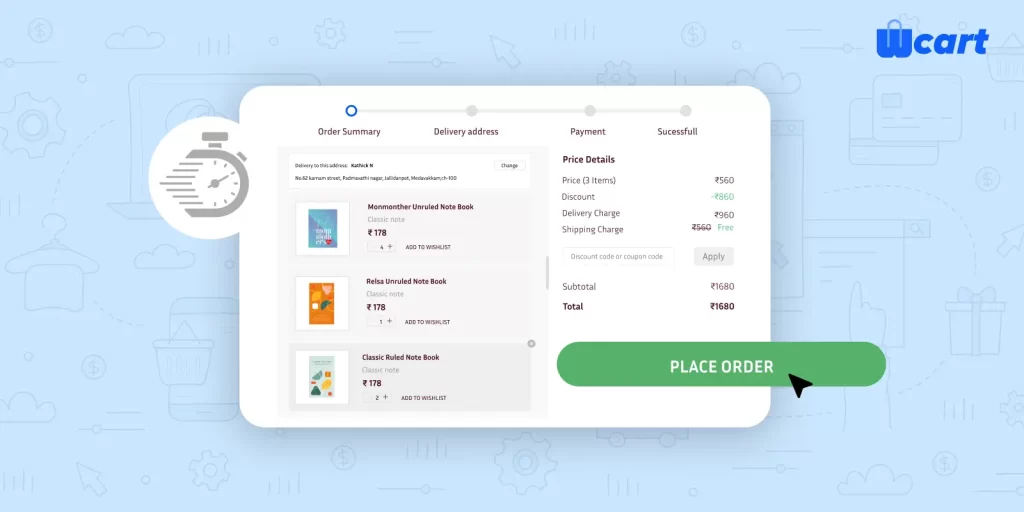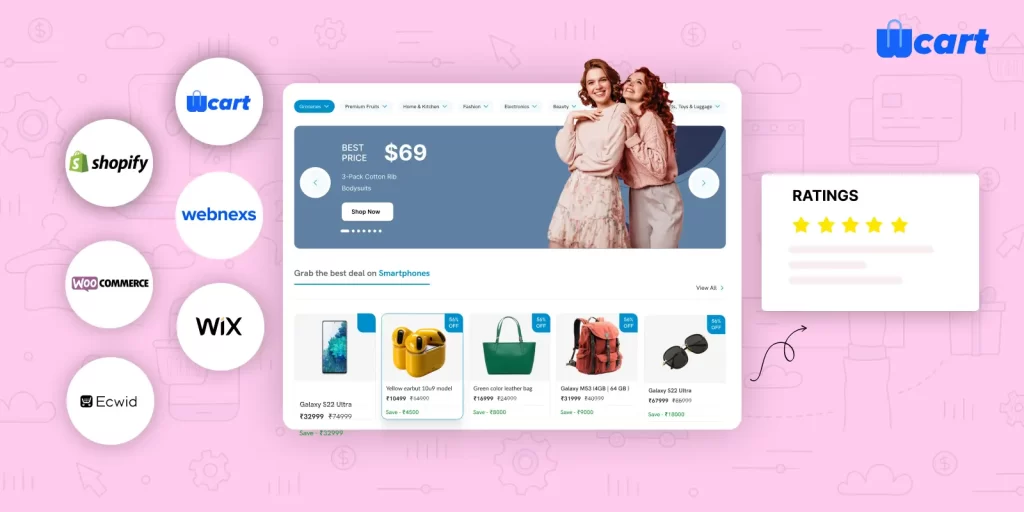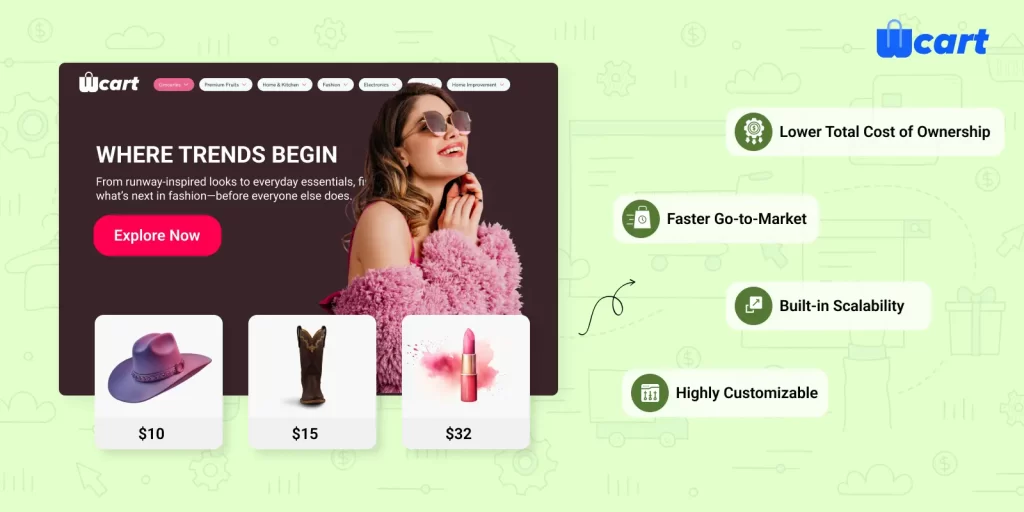BigCommerce not working for your business? Here is why brands are switching to Wcart and other faster, more scalable platforms.
BigCommerce is often considered as a flexible and scalable ecommerce platform. But for many businesses, especially those who enter rapid growth stages, it feels too expensive.
When companies add more functionality, integrations and backend customizations, BigCommerce’s promise of flexibility leads to ballooning development costs and delayed launches.
As this keeps on going updates become risky and internal teams struggle with time-to-market. End of the day conversion rates and increase in customers are frustrated.
These challenges have pushed many merchants to seek simpler and more efficient alternatives.
Let’s dive into the key pain points that businesses are facing with BigCommerce and the best alternatives to BigCommerce.
What is Driving the Shift Away from BigCommerce?

Challenge #1 – High Total Cost of Ownership (TCO)
At first, BigCommerce advertises lower platform fees when compared to other enterprise ecommerce solutions. But the clients quickly realize the true total cost of ownership, especially as their business begins to scale.
Rapidly growing ecommerce brands need scalable solutions with built-in features like multi-storefront support, robust promotional tools, and seamless third party integrations.
But with BigCommerce this often requires custom development and third party integrations.
In contrast, modern BigCommerce competitors like Wcart or Shopify plus include much of the functionality to reduce reliance on IT teams.
Why This Matters:
- Higher development costs over time
- Increased operational complexity
- Slower launch cycles for new features
- Bottlenecks across marketing, merchandising, and IT
Challenge #2 – Poor Checkout Conversion Rates
No matter how much traffic your store generates, a slow or clunky checkout experience can sink your conversion rates and directly impact revenue.
BigCommerce checkout functionality is not optimized as much as Wcart. Many merchants on BigCommerce face performance issues when they customize their checkout flow.
Since the platform often requires custom development or third-party plugins to enable standard features like address auto-complete, multi-payment support, or mobile-first design.
It makes the checkout a frustrating process. The result? Cart abandonment increases, page load times suffer, and UX improvements become costly.
Always shoppers demand faster and more intuitive buying experiences. BigCommerce competitors like Wcart offer an optimized checkout experience out of the box.
Why It Matters:
- Poor UX leads to higher cart abandonment and lower AOV (Average Order Value)
- BigCommerce requires extensive development work for checkout customization
- Wcart delivers conversion-optimized checkout natively
- Better performance = more sales with fewer technical headaches
Read more: To know the common challenges of b2b and its solution
Challenge #3 – Slow Time to Market
Speed matters in ecommerce. Launch of new products, instant response to trends or running a seasonal campaign is very important. But brands with BigCommerce have slower time to market.
That’s because BigCommerce often requires developer intervention for even routine updates. From adding new site sections to launching multi-storefronts or syncing systems.
The more custom code in the stack, the greater the risk of broken rollouts, and the longer it takes to recover. This level of dev reliance introduces major friction. Marketing teams can’t move fast.
That’s why more scaling brands are considering BigCommerce alternatives like Wcart, which is built for rapid deployment and low-code customization.
With Wcart, business users can manage launches, content updates, and product rollouts without waiting on dev queues.
Common Issues Slowing Brands Down on BigCommerce:
- Developer bottlenecks for non-technical updates
- Rigid deployment processes that delay time-sensitive initiatives
- Frequent QA issues due to fragile custom builds
- Higher risk of bugs, broken experiences, and rollback requirements
Challenge #4 – Limited Native Features and App Ecosystem
A flexible platform is the much needed one for all the ecommerce brands. BigCommerce falls short when it comes to built-in ecommerce functionality.
Mostly the brands are needed to be dependent on third party apps or custom builds for even basic needs.
BigCommerce often pushes users into patching gaps with apps and ends up in custom development to replicate standard capabilities.
More apps mean more fees, more maintenance, and a higher risk of integration conflicts. Plus, the quality and depth of BigCommerce’s app ecosystem pales in comparison to platforms like Wcart or Shopify.
The Hidden Cost of Flexibility on BigCommerce:
- Must-build features like waitlists, back-in-stock alerts, or bundles
- Over reliance on paid third-party apps
- Poor app integration and inconsistent performance
- Limited extensibility in core areas like search, merchandising, and loyalty
BigCommerce Alternatives: Feature-by-Feature Breakdown
Total Cost of Ownership Comparison
Merchants who optimize TCO by choosing the right platform report an average ROI increase of 211% over a 3-year period
BigCommerce
Subscription Costs
- Free trial is available for 15 days
- $29/month for standard plan
- $79/month for plus plan
- $299/month for pro plan
- Custom pricing is also available
Transaction Fees
BigCommerce does not charge transaction fees, which is a major advantage for businesses looking to avoid extra costs.
Hosting Costs
Hosting is included in the subscription, so there are no separate hosting fees.
Customization and Maintenance
BigCommerce is not much easy to customize, and businesses may need developer assistance for advanced features. Maintenance costs are moderate but depend on your feature requirements.
App Costs
BigCommerce has a comprehensive app marketplace, but some premium apps and integrations may cost between $10 and $100+ per month.
Wcart
Subscription Costs
- Free trial is available for 14 days
- $30/month for small store
- $89/month for boutique
- $689/month for super store
- Custom pricing is also available
Transaction Fees
Wcart does not charge any transaction fees. By this it allows the businesses to keep the 100% of earnings.
Hosting Costs
Hosting is included in the subscription, so there are no separate hosting fees.
Customization and Maintenance
Wcart provides extensive customization options. It allows businesses to create a unique and personalized online store without any technical knowledge.
App Costs
Wcart offers essential features that are needed to run an online store. If you are in need of some other advanced features, it will cost you some penny.
Shopify
Subscription Costs
- Free trial is available for 3 days
- $29/month for Shopify basic plan
- $79/month for Shopify grow
- $299/month for Shopify advanced
- $2300/month for Shopify plus
Transaction Fees
Shopify charges transaction fees when you use third-party payment providers for your online store. These fees vary depending on your Shopify plan. If you use Shopify Payments, you don’t have to pay the third-party transaction fees.
Hosting Costs
Hosting is included in the subscription, so there are no additional hosting fees.
Customization and Maintenance
Shopify is a basic ecommerce platform, when it comes to integration of custom functionalities, businesses may need developers. Apps and plugins can help extend functionality, often at a monthly cost.
App Costs
Shopify apps can cost anywhere from a few thousand dollars for a simple app to upwards of $75,000 for a complex one, depending on features, design, and integrations.
Read more: To know about Shopify alternatives
Adobe Commerce (Magento)
Subscription Costs
Adobe Commerce’s cloud version starts at around $22,000 per year, making it a higher-end option for larger businesses.
Hosting Costs
Hosting is not included in the open-source version, so businesses must arrange for their own hosting.
Customization and Maintenance
Adobe Commerce requires significant development for both customization and maintenance. It is a highly flexible platform but often necessitates a dedicated team of developers.
App Cost
Adobe Commerce has a vast array of extensions, many of which are premium and can add up quickly. These costs are typically higher than those found on other platforms.
Read more: To know about Magento alternatives
Salesforce Commerce Cloud
Subscription Costs
Salesforce Commerce Cloud’s pricing is often based on factors like user licenses, gross merchandise value(GMV) and add ons. For the exact pricing details you should consult with the team.
Hosting Costs
Hosting is included as part of the subscription, so there are no separate hosting fees.
Customization and Maintenance
This platform is highly customizable but requires specialized Salesforce developers for both implementation and ongoing maintenance.
App Costs
Many integrations and third-party apps can be costly, especially given Salesforce’s enterprise-focused ecosystem.
Checkout Conversion Comparison

A 1-second improvement in page load time can lead to a 5.6% increase in conversion rates and a 12% decrease in bounce rates
Speed to Checkout
BigCommerce
BigCommerce offers a fast checkout process, but performance may vary depending on customizations and product catalog size. Large stores might experience slower load times.
Wcart
Wcart provides a fast and streamlined checkout process with customizable options to enhance user experience. Also use of Wcart platform results in less cart abandonment rates.
Shopify
Shopify provides a fast, streamlined checkout process. It’s optimized for performance, helping to reduce cart abandonment.
Adobe Commerce
Adobe Commerce is highly customizable, but the checkout speed may be slower due to its complex features. Performance depends heavily on optimization.
Salesforce Commerce Cloud
Salesforce Commerce Cloud offers robust checkout functionality, with enterprise-level optimization for speed. But performance can be slower if customization is not well optimized.
Read more: To choose the best online store builder
UX Ratings

BigCommerce
BigCommerce provides a solid user experience but can be less intuitive for those without prior technical experience.
Wcart
Wcart offers an intuitive and user-friendly interface, making it easy for both beginners and experienced users to navigate the platform effortlessly.
Shopify
Shopify is well-known for its clean and intuitive user interface. Both merchants and customers find it easy to navigate.
Adobe Commerce
Adobe Commerce offers a high-quality UX, but the complexity of customization can make it more difficult to use for non-technical users.
Salesforce Commerce Cloud
Salesforce offers an excellent UX, especially for large-scale, enterprise-level businesses. However, it can be complex for smaller merchants or those without dedicated teams.
Read more: To design a user friendly online store
Platform Scalability and Maintenance Comparison
| Platform | Developer Load | Feature Release Time | App/Plugin Ecosystem |
| BigCommerce | Low for basic needs, advanced customizations may require developer support. | Quick rollout via built-in features and APIs. | Solid marketplace with essential apps, some premium costs apply. |
| Wcart | Minimal developer dependency, most functions can be handled without coding. | Fast feature deployment, lightweight and agile framework. | Growing ecosystem, covers core needs with simple integration. |
| Shopify | Low for most tasks, advanced edits may require liquid coding. | Rapid release using app store and built-in tools. | Extensive ecosystem, thousands of free and paid apps for all use cases. |
| Adobe Commerce | High developer involvement required for scaling and updates. | Slower release due to testing and complexity of custom development. | Large plugin base via Magento Marketplace often requires developer configuration. |
| Salesforce Commerce Cloud | High dev resources needed, complex setups need dedicated teams. | Slower for custom environments, requires detailed planning and testing. | Powerful enterprise-grade plugins, complex and often tailored for large businesses. |
Read more: To know the top ecommerce platforms
Why Brands Choose Wcart Over BigCommerce

When brands are scaling fast, they need a platform that won’t hold them back. Wcart emerges as the preferred BigCommerce alternative for ambitious D2C brands and enterprise retailers. Here’s why leading businesses choose Wcart for their ecommerce operations
Lower Total Cost of Ownership (TCO)
In the long run Wcart saves you more money. Unlike BigCommerce, which often requires third-party apps and developer dependency. Wcart gives all the necessary functionalities as a built-in feature. So it reduces both upfront and ongoing costs.
Faster Go-to-Market
Speed matters. Wcart accelerates your launch timeline with pre-built templates, modular architecture, and a streamlined setup process. Teams can go from idea to live store in days, not months.
We are highly satisfied with them and recommend them highly since they completed the project within the committed time frame and at a reasonable price.
Gokulakrishnan – Owner at Chatskart
Built-in Scalability
As traffic surges and SKUs grow, Wcart’s cloud-native infrastructure ensures your store stays fast, stable, and secure. It might be your day for flash sales or going global, Wcart scales for you automatically.
Highly Customizable
No two brands are alike. Wcart is built to adapt to your business, not the other way around. With fully customizable storefronts, flexible APIs, and extensive plugin support, you can create a branded experience that feels unique.
Read more: To know top ecommerce business models
Wcart Super Store for Enterprise Use Cases
Wcart super store for enterprise level businesses. Here’s how it beats BigCommerce in enterprise use cases:
Headless Capabilities
Wcart supports true headless commerce out of the box. Seamlessly integrate with your CMS, PIM, CRM, or mobile apps using modern APIs and GraphQL. Advantage of headless commerce setup is decoupled experiences that delight users across every channel.
Checkout Extensibility
From custom payment flows to tailored checkout logic, Wcart’s checkout layer is fully extensible. Whether you need one-page checkouts, BNPL integrations, or advanced tax rules, you have full control, no limitations.
Performance at Scale
Enterprise brands cannot afford downtime or latency. Wcart is built for high-traffic environments, lightning-fast page loads, 99.99% uptime, and seamless performance even during peak demand.
The Strategic Alternative to BigCommerce
Many brands face the same frustrations with BigCommerce. Like limited customization, dependency on developers, slow go-to market sales, extra costs as you scale.
Wcart was built to solve these exact pain points. With faster implementation, greater flexibility, and lower total cost of ownership.
If you are finding yourself hindered by platform constraints, just leave it and look for a better alternative.
Discover how Wcart addresses these challenges.




Leave a Reply